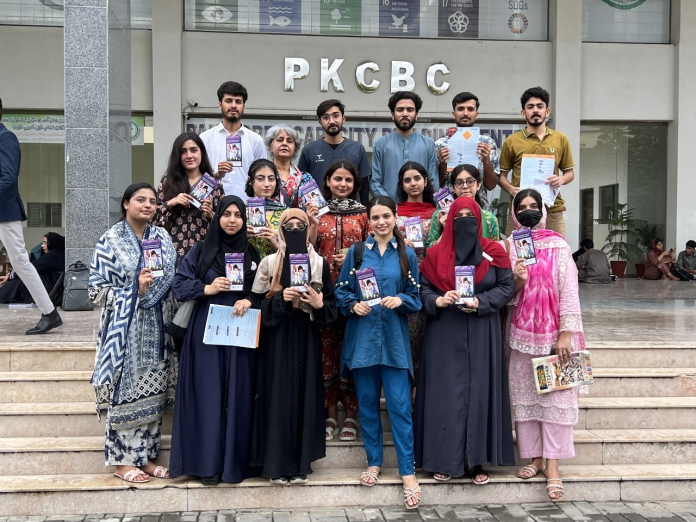DNA
RAWALPINDI : Thursday, 26 June 2025 – To support a youth-led campaign titled “Her Health, Her Rights,” PODA, in collaboration with the District Population Office Rawalpindi, organized an awareness session for more than 60 male and female students, focusing on female hygiene—particularly menstrual, sexual, and reproductive health. The session was held at the KIOCA Seminar Hall of PMAS Arid Agriculture University, Rawalpindi.
Representing PODA, Nabeela Aslam briefed the participants about PODA’s work for the protection and promotion of the rights of women, youth, persons with disabilities (PWDs), and other marginalized segments of society, with a special focus on the rights of rural women in Pakistan. She highlighted PODA’s flagship Annual Rural Women Leadership Training Conference, which will mark its 18th year of celebration this year. She also shared observations from the ongoing three-year project “Reduce Early Marriages to Enhance Gender Equality,” supported by the Norwegian Embassy in Islamabad. Through this project, a wide range of awareness activities on sexual and reproductive health and rights (SRHR) are being conducted at various levels—from schools to key district government departments, including health, education, population, social welfare, and local government institutions.
During the session, she presented an oral testimony of a Grade 8 student suffering from severe health complications due to early marriage, with her kidneys now on the verge of failure. The girl faced immense physical strain as a result of being married at a young age. Nabeela Aslam also highlighted critical issues related to menstrual hygiene, including the inappropriate use of sanitary pads and unhygienic practices that lead to infections. She pointed out that many girls stop drinking water and avoid bathing during their periods, which further contributes to health problems. She emphasized the increasing cases of urinary tract infections (UTIs) caused by poor menstrual hygiene.
Representing the District Population Office, Dr. Anaam Mushtaq, Women’s Health Officer at the Family Health Clinic, Benazir Bhutto Hospital, Rawalpindi, gave a detailed presentation on urinary tract infections (UTIs) and sexually transmitted infections (STIs). She emphasized the importance of improved hygiene practices, describing them as the foundation of women’s health.
In response to a question about how one can identify reproductive health issues, she explained that it is important to understand your body and be aware of its normal conditions. This self-awareness helps in detecting abnormalities related to reproductive tract infections (RTIs) and breast health.
The participants raised various questions on period-related cramps and pain, irregular menstrual cycles, and infections such as RTIs and UTIs. Dr. Mushtaq explained that if RTIs and UTIs are left untreated for an extended period, they can become more serious, spreading to other reproductive organs and potentially leading to kidney failure. She also clarified that not all RTIs are sexually transmitted infections (STIs).
The speakers emphasized the importance of menstrual hygiene, proper nutrition, and adequate hydration to prevent urinary tract infections (UTIs). They urged participants to drink plenty of water and urinate frequently as key measures to avoid UTIs. Proper hygiene of the private parts was also stressed, including thoroughly washing and cleaning to prevent fecal matter from reaching the vagina. The discussion further included anemia and the role of balanced nutrition in maintaining overall reproductive health.
The group coordinator, Asad Hayat, sought support from the Director of Student Affairs and the Aridian Health Care Society (AHCS) of PMAS Arid Agriculture University. Both warmly welcomed the initiative and actively mobilized their students to participate in the session. Group members included Rohma Rauf, Nisha Ilyas, and Junaid Zahid.
The group received appreciation for their effort to involve men in learning about female reproductive health and the consequences of delayed or inadequate treatment. They explained that through their initiative, “Her Health, Her Right,” they aimed to break the stigma surrounding open discussions on women’s health, particularly menstruation and its management. They emphasized that lack of awareness and proper information can lead to serious health complications for women.

















